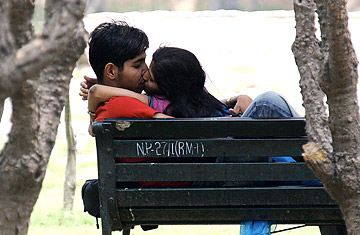
A couple kiss in a public park in New Delhi.
Taken together, however, the two tales of romance say as much about how Indian society has changed over the past few decades as any economic indicator or business deal. Where love in India was once a very private affair, it's now on display all over the movies and soap operas, magazines and newspapers, and between young couples canoodling in parks. At this time of year, wedding season and the lead up to Valentine's Day — a Western tradition increasingly popular in India's more cosmopolitan cities — it's even more noticeable.
It may seem strange in the land of the Taj Mahal — one of the greatest-ever public displays of affection, built by the Mughal Emperor Shah Jahan as a mausoleum for his late wife — that an increase in public displays of affection is so notable, but this increase is a departure for a culture that has long kept hidden its romantic emotions. In the recent past, unmarried couples would not hold hands in public, let alone kiss or cuddle. Affairs were hushed up, as Gandhi's was for more than eight decades.
But globalization has brought cultural influences from abroad, which have begun to change India's own habits: satellite television, which carries soap operas with far racier storylines than the average Bollywood flick; Indian versions of Western magazines such as Marie Claire and Cosmo, which discuss sex in detail only slightly less graphic than do their sister publications abroad; even the growth of cafes, which have become the dating spot of choice for many young urban couples looking for a quiet place to sit and chat. "There has been more social change in the past 10 years than in the last 100," says Mumbai-based writer Shobhaa D, who has written both fictional and non-fictional explorations of love. "You can't discount the very important influence of things like satellite TV. Not only have young people seen that it's OK to show your feelings, their parents have seen it's OK to show your feelings."
The changes aren't welcomed by all Indians, the vast majority of whom live outside major cities and remain far more conservative than their urban cousins. Police officers have been known to rough up young couples holding hands in public parks. Over the past few years a group of Hindu nationalists around the country have burned Valentine's Day cards and branded the festival "cultural corruption." Kissing still raises eyebrows when depicted in big Bollywood movies. Even the announcement of Rai and Bachchan's impending nuptials brought an old-fashioned reaction from his father, the Bollywood legend Amitabh Bachchan. Bachchan senior described his son's fiancee, who has mixed beauty with business savvy to create a small fortune of her own, as a "simple, traditional and a home-loving individual".
"That's a very last-century statement to make," laments D. "This is an incredibly empowered woman who is a world-beater, and he's calling her traditional?"
Old-fashioned views aren't likely to reverse the new trend, however. Just ask 20-year-olds Nisha Ahuja and Lakshya Singh, Delhi students who have been dating for the past nine months. "India is a democratic country. I have a right to say to her that I love her and she should have a right to tell me that she loves me. Why should anyone tell us we can't?" asks Singh over coffee in a central cafe where the two often meet. "People have become more independent," says Ahuja. "They want to be able to decide things for themselves."
The two mix modern and traditional as effortlessly as they handle their mobile phones. That, in fact, is the way they met: via a cell phone dating service. She liked his "attitude, his way of responding which was very decent." He liked that Ahuja "didn't want to talk nonsense." They hope one day to get their two families together so they can arrange a hybrid of a love marriage and an arranged one by getting the mutual consent of both sets of parents. "Youngsters just want to show their feelings," says Singh. "And if people don't like that then that's their problem."
